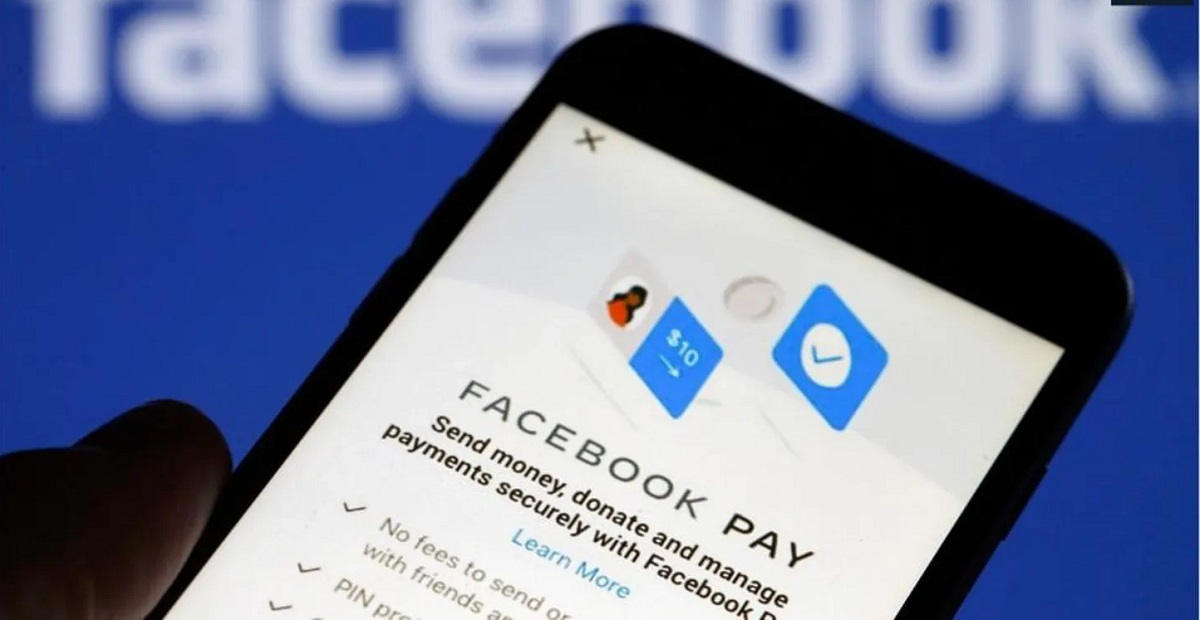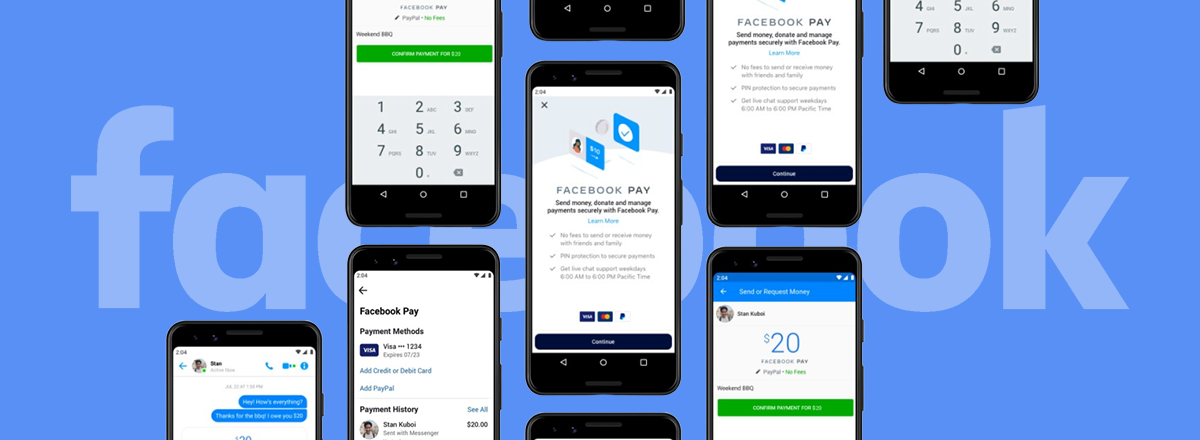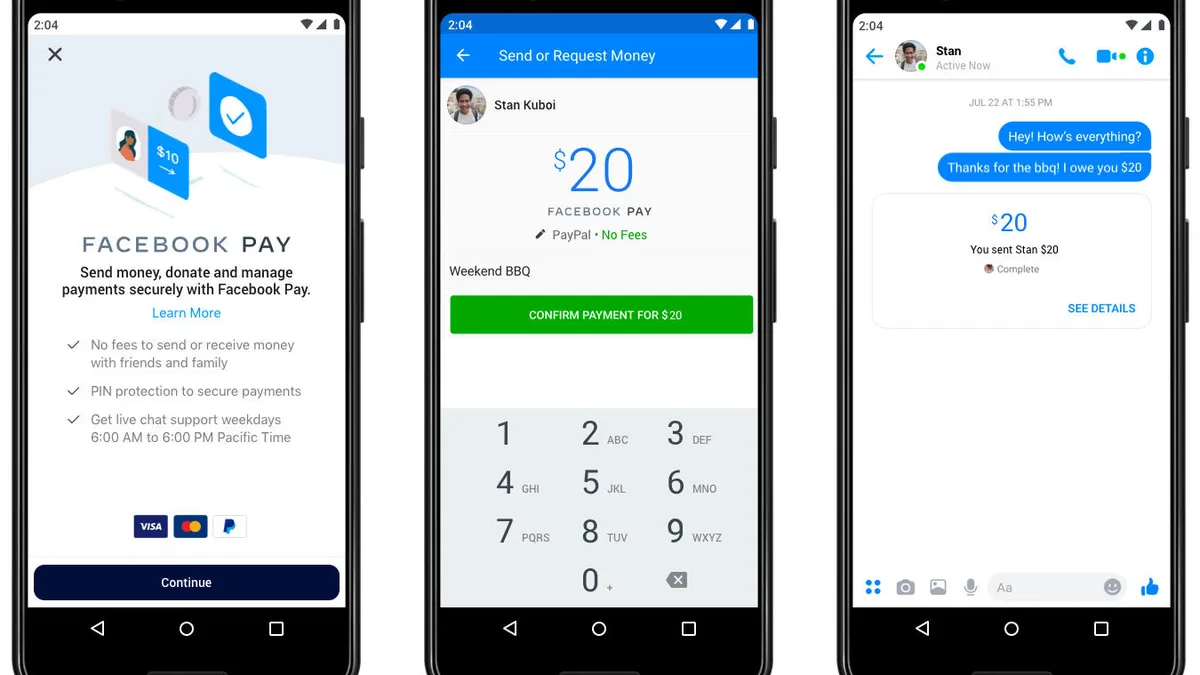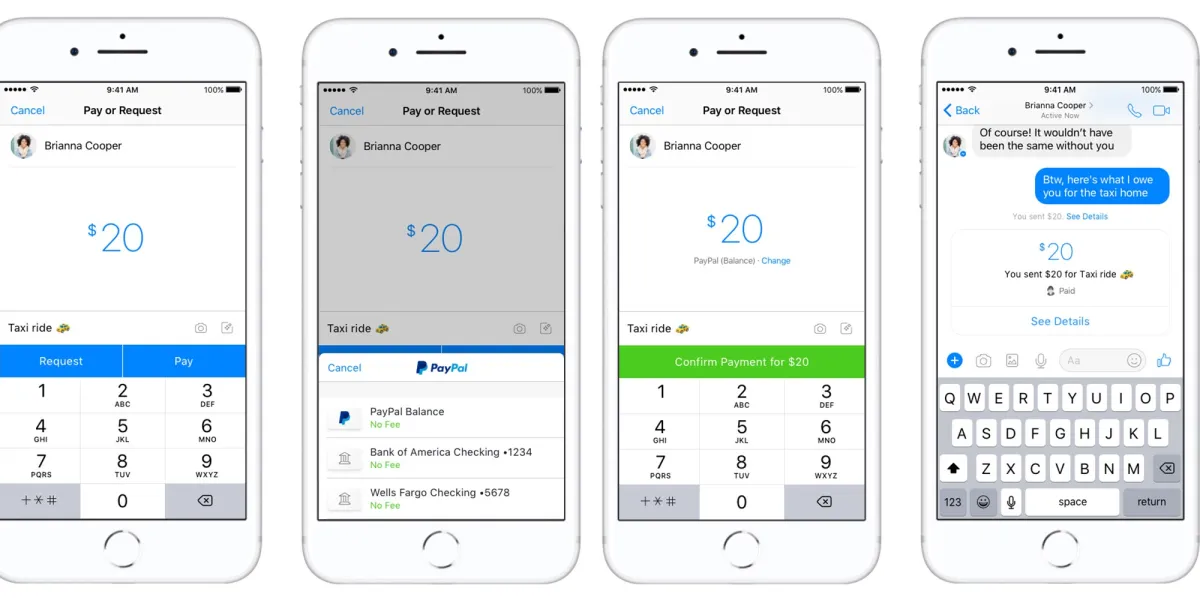Introduction
Facebook Pay has emerged as a popular digital payment method for Facebook users around the world. Launched in late 2019, Facebook Pay allows users to send and receive money securely within the Facebook ecosystem. With the convenience of transactions integrated across platforms like Facebook, Messenger, WhatsApp, and Instagram, Facebook Pay has garnered a significant user base.
This article aims to provide an overview of Facebook Pay’s security features and its ability to safeguard user information during transactions. We will delve into the encryption and security measures employed by Facebook Pay, explore the various authentication methods utilized to protect user accounts, and shed light on the privacy and data protection policies in place.
Facebook Pay has incorporated a range of features to combat fraud, including advanced fraud prevention systems and dispute resolution mechanisms. We will examine these safeguards in detail, highlighting how they contribute to the overall security of transactions made through Facebook Pay.
Furthermore, we will explore the integration of Facebook Pay with popular messaging platforms like Messenger, WhatsApp, and Instagram, assessing the security measures implemented to ensure smooth and secure transactions across these platforms.
While Facebook Pay offers a convenient and secure way to make digital payments, it is essential to understand its limitations and potential risks. We will examine these aspects to provide a comprehensive understanding of the security implications associated with using Facebook Pay.
It is crucial to note that this article will focus primarily on the security aspects of Facebook Pay. Other features, such as transaction fees, availability in different countries, and functionality, may vary and can be explored through official Facebook resources and user documentation.
Facebook Pay: An Overview
Facebook Pay is a digital payment service provided by Facebook that allows users to send and receive money securely within the Facebook ecosystem. It simplifies the process of making payments by enabling transactions across multiple Facebook-owned platforms, including Facebook, Messenger, WhatsApp, and Instagram.
With Facebook Pay, users have a centralized platform for managing their payment information and making secure transactions with ease. By linking their preferred payment method, such as a credit card or PayPal account, to their Facebook Pay account, users can initiate transactions without the need to re-enter their payment details for each transaction.
One of the advantages of using Facebook Pay is its seamless integration with the various platforms it supports. Users can send money to friends and family, make purchases from businesses, donate to fundraisers, and even buy event tickets, all within the Facebook app or its affiliated platforms.
Facebook Pay also offers a feature called “Buy Buttons,” which allows businesses to sell products and services directly through the Facebook platform. This convenient integration streamlines the purchasing process for users, making it more convenient to buy items or services they discover while browsing their social feeds.
Another notable aspect of Facebook Pay is its availability across different countries. Although the service was introduced in the United States initially, Facebook has been expanding its reach, gradually making it available in other countries as well. This expansion ensures that users around the world can enjoy the benefits of the secure and convenient digital payment solution provided by Facebook Pay.
Furthermore, Facebook Pay is designed to be user-friendly, making it easy for anyone, regardless of their technical expertise, to navigate and use the service. The interface is intuitive, with clear prompts and instructions, ensuring that users can quickly understand how to send or request money, view transaction history, and manage their payment settings.
Overall, Facebook Pay presents a comprehensive payment solution that not only simplifies transactions across multiple platforms but also prioritizes security and user convenience. By integrating payment functionalities within the Facebook ecosystem, Facebook Pay provides users with a seamless and secure method of making payments, enhancing the overall user experience.
Encryption and Security Measures
Facebook Pay prioritizes the security of user transactions by implementing robust encryption and adopting strict security measures throughout its platform. Encryption is used to protect sensitive information, such as payment details and personal data, ensuring that it remains secure during transmission and storage.
When a user initiates a transaction through Facebook Pay, the payment information is encrypted using industry-standard encryption protocols. This encryption ensures that the data is only accessible by authorized parties, making it significantly more difficult for hackers or unauthorized individuals to intercept or decipher the information.
In addition to encryption, Facebook Pay leverages secure servers and data storage practices to safeguard user information. This includes employing firewalls, employing secure sockets layer (SSL) certificates, and regularly conducting security audits to identify and address any potential vulnerabilities.
To further enhance security, Facebook Pay also implements multiple security layers that work in conjunction to prevent unauthorized access to user accounts. This includes the implementation of strong password requirements, multi-factor authentication, and proactive account monitoring to detect and prevent fraudulent activities.
Furthermore, Facebook Pay incorporates advanced fraud detection systems that monitor transactions for any suspicious or fraudulent activities. Using sophisticated algorithms and machine learning, these systems can identify and flag potentially fraudulent transactions, helping to protect users from unauthorized or fraudulent transactions.
It is worth noting that while Facebook Pay prioritizes the security of user transactions, it is crucial for users to also take necessary precautions to protect their accounts. This includes setting strong, unique passwords, enabling two-factor authentication, and regularly reviewing their transaction history for any unauthorized activity.
Overall, the encryption and security measures implemented by Facebook Pay are designed to ensure the privacy and security of user transactions. By leveraging strong encryption protocols, secure servers, and multiple layers of security, Facebook Pay strives to provide users with a safe and secure platform for making digital payments within the Facebook ecosystem.
Authentication Methods
Facebook Pay incorporates various authentication methods to protect user accounts and ensure that only authorized individuals can initiate transactions. These authentication methods add an extra layer of security, preventing unauthorized access to user payment information and transactions.
One primary authentication method used by Facebook Pay is password-based authentication. Users are required to create a strong, unique password during the registration process. This password acts as the first line of defense in protecting user accounts, and it is essential for users to choose a password that is not easily guessable and to regularly update it to maintain its strength.
In addition to passwords, Facebook Pay also supports multi-factor authentication (MFA). MFA adds an extra layer of security by requiring users to provide additional verification to access their accounts. This can be done through methods such as SMS codes, email verification, or the use of authentication apps. With MFA enabled, even if an unauthorized individual gains access to a user’s password, they will still require the secondary authentication method to complete the login process.
Furthermore, Facebook Pay leverages device authentication to ensure that transactions can only be initiated from trusted devices. When a user logs in or initiates a transaction from a new device, Facebook Pay may prompt additional verification steps, such as confirming the identity through an email or SMS verification code. This helps to prevent unauthorized access to user accounts, even if the password is compromised.
It is important for users to be diligent in safeguarding their authentication methods. This includes keeping passwords confidential, not sharing verification codes with others, and regularly reviewing and validating the devices associated with their Facebook Pay account.
By implementing various authentication methods like passwords, multi-factor authentication, and device authentication, Facebook Pay strives to provide users with a secure environment that protects their payment information and transactions from unauthorized access.
User Privacy and Data Protection
Protecting user privacy and ensuring data protection are key priorities for Facebook Pay. As a payment service, Facebook Pay adheres to stringent privacy policies and security measures to safeguard user information and maintain user trust.
Facebook Pay follows strict guidelines regarding the collection, storage, and usage of user data. User data is securely stored and encrypted to prevent unauthorized access. Facebook Pay also limits access to user data to authorized personnel and only retains the necessary information required for transactional purposes.
When it comes to sharing user data, Facebook Pay operates on a need-to-know basis. User data is only shared with third parties in limited circumstances, such as complying with legal requirements or when necessary to prevent fraud or unauthorized use of the service.
To enhance user privacy, Facebook Pay allows users to control their privacy settings and decide who can see their payment activity and transaction history. Users can adjust their privacy settings to their desired level of visibility, ensuring that their payment information is shared only with the intended recipients.
Facebook Pay also adheres to industry-standard security practices to protect user data from unauthorized access or data breaches. This includes regularly monitoring and updating the security infrastructure, conducting regular security audits, and employing a dedicated team to address privacy and security concerns.
It is important for users to understand the privacy policies and settings associated with Facebook Pay. By reviewing and adjusting their privacy settings, users can have greater control over the visibility of their payment activity and protect their personal information.
However, while Facebook Pay takes significant steps to protect user privacy and data, it is important for users to remain vigilant and exercise caution. This includes being mindful of the information shared during transactions and taking precautions to protect personal data, such as avoiding sharing sensitive information through insecure channels and exercising caution when interacting with unfamiliar or suspicious entities.
Overall, Facebook Pay strives to ensure user privacy and data protection by implementing robust security measures and providing users with control over their privacy settings. By adhering to strict privacy policies and industry-standard security practices, Facebook Pay aims to create a trusted and secure environment for users to make digital transactions within the Facebook ecosystem.
Fraud Prevention and Dispute Resolution
One of the top priorities for Facebook Pay is to protect users from fraud and ensure that disputes are resolved in a fair and timely manner. To achieve this, Facebook Pay has implemented several measures and processes to prevent fraudulent transactions and address any issues that may arise.
Facebook Pay utilizes advanced fraud prevention systems that monitor and analyze transactions in real-time. These systems employ sophisticated algorithms and machine learning to identify potential signs of fraudulent activity, such as unusual spending patterns or suspicious account behavior. If any suspicious transaction is flagged, additional verification steps may be required to ensure the legitimacy of the transaction.
In the event that a user encounters an unauthorized transaction or experiences any payment-related issue, Facebook Pay offers a clear and accessible dispute resolution process. Users can report any suspicious or unauthorized activity through the Facebook Pay support center, and the dedicated support team will investigate the issue and take appropriate actions to resolve the dispute.
Facebook Pay also acts as a mediator between buyers and sellers in cases of disputes related to purchases from businesses. If a user encounters a problem with a transaction, such as receiving a defective product or not receiving the purchased item, they can contact the seller through Facebook Pay and attempt to reach a resolution. In cases where a resolution cannot be reached, users have the option to escalate the dispute to Facebook Pay support for further assistance.
Furthermore, Facebook Pay strives to create a transparent and secure environment by providing users with detailed transaction histories and receipts. Users can access their transaction history and review the details of each transaction. This information can be crucial in case a dispute arises, as it provides evidence and documentation to support a user’s claim.
It is important for users to be proactive in monitoring their transactions and reviewing their transaction history regularly. This allows users to quickly identify any unauthorized activity or discrepancies and report them to Facebook Pay for prompt resolution.
Overall, Facebook Pay is committed to preventing fraud and ensuring fair dispute resolution. By employing advanced fraud prevention systems, offering a transparent and accessible dispute resolution process, and acting as a mediator between buyers and sellers, Facebook Pay works to provide a secure and confident payment experience for its users.
Integration with Messenger, WhatsApp, and Instagram
One of the key advantages of using Facebook Pay is its seamless integration with the popular messaging platforms Messenger, WhatsApp, and Instagram. This integration allows users to make secure and convenient transactions within the familiar environments of these platforms.
Facebook Pay’s integration with Messenger allows users to send money to friends and family directly within their conversations. Whether it’s splitting a bill, sending a gift, or repaying a friend, users can initiate payments with ease, without the need to switch to a separate payment app or platform. The integration streamlines the payment process, making it convenient and efficient for users to transfer money to their contacts.
Similarly, Facebook Pay’s integration with WhatsApp enables users to send money securely within their WhatsApp conversations. Whether it’s paying for a shared group expense or sending money to a family member, users can initiate payments within the WhatsApp app without the hassle of switching to another payment service or sharing bank details. The integration provides a seamless and secure way to make digital payments within the WhatsApp messaging platform.
Instagram, another popular platform owned by Facebook, also benefits from the integration with Facebook Pay. Users can make purchases directly within the Instagram app from businesses that utilize Facebook Pay’s “Buy Buttons” feature. The integration simplifies the purchasing process, allowing users to buy products or services they discover while browsing their Instagram feed with just a few taps.
It is worth noting that the integration of Facebook Pay with these platforms ensures that the payment process remains secure and encrypted. Users can have peace of mind knowing that their payment information is protected and that the transactions are carried out within the trusted environments of Facebook, Messenger, WhatsApp, and Instagram.
By integrating with these popular messaging platforms, Facebook Pay offers users a seamless and unified payment experience. Users can initiate transactions, send money, and make purchases within the platforms they already use and trust, eliminating the need to navigate between multiple apps or websites. This integration enhances convenience, reduces friction, and provides a secure and familiar environment for users to make digital payments.
Facebook Pay Security Features
Facebook Pay incorporates a range of security features to ensure the protection and integrity of user transactions. These features work together to enhance the overall security of Facebook Pay and provide users with a trusted and secure environment for making digital payments.
One of the prominent security features of Facebook Pay is its strong encryption measures. User data, including payment information and personal details, are encrypted using industry-standard encryption protocols. This encryption ensures that sensitive information is protected during transmission and storage, making it significantly more challenging for unauthorized individuals to access or decipher this data.
In addition to encryption, Facebook Pay implements rigorous security practices and follows industry best practices to secure its infrastructure. This includes regularly conducting security audits, employing firewalls and secure socket layer (SSL) certificates, and staying updated with the latest security patches and measures. By adhering to these practices, Facebook Pay minimizes vulnerabilities and ensures a secure environment for users.
Another important security feature of Facebook Pay is its focus on user authentication. Strong password requirements are in place to prevent unauthorized access to user accounts. Additionally, Facebook Pay supports multi-factor authentication (MFA), requiring users to provide additional verification through methods like SMS codes or authentication apps. These authentication measures add an extra layer of protection and help safeguard user accounts from unauthorized access.
Furthermore, Facebook Pay employs advanced fraud detection systems to monitor transactions for signs of suspicious or fraudulent activities. Machine learning algorithms analyze transaction patterns and user behavior to identify potential risks. Any flagged transactions are reviewed and, if necessary, additional verification steps are initiated to ensure the legitimacy of the transaction. This proactive approach to fraud prevention helps protect users from unauthorized transactions or fraudulent activities.
To provide users with peace of mind, Facebook Pay offers a dedicated support team that assists users with any questions, concerns, or issues related to their transactions. Users can reach out to the support center to report suspicious activity, resolve disputes, or seek assistance for any payment-related inquiries. The support team ensures that user concerns are addressed promptly and aims to provide a seamless and secure experience for users.
Overall, Facebook Pay employs a combination of encryption, authentication methods, fraud detection systems, and a dedicated support team to enhance the security of user transactions. By implementing these security features, Facebook Pay aims to provide users with a reliable and trusted platform for making digital payments within the Facebook ecosystem.
Limitations and Risks of Facebook Pay
While Facebook Pay offers a convenient and secure way to make digital payments, it is essential to understand the limitations and potential risks associated with using the service.
One of the main limitations of Facebook Pay is its availability. Although Facebook Pay is gradually expanding its reach, it may not be available in all countries or regions. Users should check for availability in their respective locations before relying solely on Facebook Pay for their payment needs.
Another limitation is the dependency on the Facebook ecosystem. Facebook Pay is integrated with Facebook, Messenger, WhatsApp, and Instagram, meaning that users need to have accounts on these platforms to use Facebook Pay. If users do not have accounts or do not use these platforms, they will not be able to leverage the benefits of Facebook Pay.
Additionally, users should be cautious when sharing sensitive information through Facebook Pay or any other digital payment service. It is vital to ensure that transactions are carried out in a secure and trusted environment, such as using encrypted Wi-Fi connections or trusted mobile networks, to reduce the risk of unauthorized access to personal and financial information.
While Facebook Pay incorporates security measures to protect user transactions, it is not immune to risks and potential vulnerabilities. Cybercriminals may employ various tactics, such as phishing attacks or malware, to gain unauthorized access to user accounts or obtain sensitive information. Users must remain vigilant and exercise caution when using Facebook Pay, including verifying the authenticity of communication or transaction requests and regularly monitoring their accounts for any suspicious activity.
Moreover, users should be aware of the privacy policies and terms of service associated with Facebook Pay. It is crucial to understand how user data is collected, stored, and used by Facebook Pay and its affiliated platforms. Users should review and adjust their privacy settings to their desired level of comfort, taking into consideration the visibility of their payment activity and transaction history.
Lastly, it is worth noting that Facebook Pay’s role is primarily limited to facilitating transactions and providing a secure platform. In cases of disputes or issues with purchases, Facebook Pay acts as a mediator, but ultimately, the responsibility lies with the buyer and seller. Users should exercise caution when making purchases and thoroughly review the terms and conditions set by the seller before initiating a transaction.
Overall, while Facebook Pay offers convenience and security, users should be aware of the limitations and associated risks. By understanding and mitigating these risks, users can make informed decisions and use Facebook Pay confidently within its intended scope.
Conclusion
Facebook Pay provides a convenient and secure digital payment solution within the Facebook ecosystem. With its seamless integration across platforms like Facebook, Messenger, WhatsApp, and Instagram, users can easily send and receive money, make purchases, and donate to fundraisers. Throughout this article, we have explored the various aspects of Facebook Pay’s security features, authentication methods, user privacy, fraud prevention, and integration with popular messaging platforms.
Facebook Pay prioritizes user security by employing strong encryption measures, implementing rigorous security practices, and offering multiple authentication methods to protect user accounts. The integration with Messenger, WhatsApp, and Instagram enhances user convenience, allowing for seamless transactions within familiar environments.
However, it is important to acknowledge the limitations and potential risks associated with using Facebook Pay. Availability may vary across different countries, and the service is dependent on having accounts on the Facebook-owned platforms. Users should also exercise caution while sharing sensitive information and remain vigilant to mitigate potential risks.
In conclusion, Facebook Pay provides a user-friendly and secure digital payment solution that enhances the convenience of financial transactions within the Facebook ecosystem. By leveraging encryption, authentication methods, and robust security measures, Facebook Pay aims to create a trusted and secure platform for users to make digital payments. While there are limitations and risks to consider, diligent use and adherence to privacy policies can help users navigate the digital payment landscape with confidence.

























